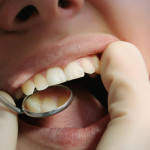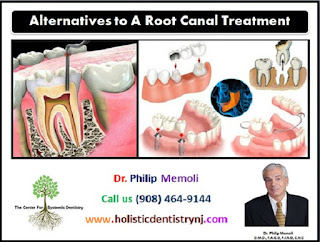Safe Mercury Amalgam Removal in Berkeley Heights, NJ
When the
element mercury accumulates to a high concentration in the body, it can lead to
a variety of acute and chronic medical problems, including organ damage and
compromise of major bodily systems. Because of the widespread usage of mercury
in dental amalgam materials, many people are susceptible to mercury toxicity
and its associated health issues.
Dentists
and toxicologists are divided over the extent of the danger posed by mercury
amalgam fillings. Even those who agree that mercury amalgam is hazardous are
further divided over whether the safer protocol is to remove them or to leave
them untouched. Paradoxically, improper removal of old fillings can cause
greater exposure to mercury. Dentists who focus on safe amalgam removal must receive
specialized training in the practice; they also follow government guidelines
for containment of mercury vapor during the procedure and disposal of mercury-containing
materials afterward.
Mercury
toxicity is a health problem that results from a variety of environmental
exposures. In addition to its widespread use in dental amalgam, mercury gets
into our surroundings from industrial processes and broken fluorescent tubes
and even from natural phenomena, such as volcanic eruptions. It is also
consumed in fish and meat; with each step up the food chain, mercury
accumulates to a greater concentration in flesh tissues.
The symptoms of mercury toxicity are manifold;
poisoning from the element can affect every part of the body, including the
neurological, central nervous, gastrointestinal, immune, neuromuscular, and
cardiovascular systems, as well as major organs, such as the brain, liver, and
kidneys. Symptoms are diverse, ranging from headache and fatigue to
gastrointestinal disorders and from muscle and bone afflictions to oral health
and gum problems.
Multiple
medical studies report that the effects
of mercury toxicity can be mitigated and often reversed when proper
procedures are implemented to remove the sources of mercury poisoning in the
body. The most common source of mercury entering the body is from mercury
fillings, suggesting that a safe, comprehensive protocol of mercury amalgam
removal and replacement can lead to a marked improvement in health.
When a
person is faced with mercury poisoning, three bodily systems—immune,
detoxification, and elimination—come into play to deal with the problem. The
first line of defense, the immune system, recognizes pathogens and foreign
substances that are injurious to health. The immune system may react by neutralizing
the threatening substance; it might also respond with chronic inflammation,
with an overreacting immune reaction, or by shutting down entirely. These
latter immune responses can lead to degenerative conditions and organ or tissue
damage.
Detoxification
works by preventing a recognized damaging substance from causing harm to the
body. The liver is the main line of defense here, though other organs, such as
the lungs and kidneys, play a role. Enzymes attach to toxins both chemically
and electrostatically, preparing them for elimination from the body. Toxins
that are difficult to neutralize, such as mercury, may undergo repeated phases
of detoxification until they are safely contained.
The
kidneys excrete simple toxins, whereas more dangerous ones are eliminated via
the colon. Some health problems can cause the detox phase to reverse, causing
subsequent repeated cycles of the elimination system. Heavy metals such as
mercury are difficult to neutralize; they stress the body’s defense systems
and, even if successfully eliminated, can leave severe damage in their wake.
A patient
coming to The Center for Systemic Dentistry will be the recipient of a state-of-the-art protocol for safe removal of mercury amalgam.
A comprehensive initial dental exam and systemic assessment determine the
extent of mercury damage. This exam and an evaluation of the patient’s overall
health help the doctor to determine if the patient is at risk of systemic
reaction in the immune, detoxification, or elimination systems.
The
removal and restoration treatment is specialized for individual affected teeth,
each of which will be repaired with one of four restoration techniques: direct
restoration, inlay restoration, only restoration, or crown restoration. The
doctor uses the patient’s exam and assessment to determine the best type of
mercury-free replacement material for each tooth.
Safety
and protection, for both patient and dental staff, are observed during all
removal and restoration procedures. Protocols for safety include cooling,
chunking, high-volume evacuation, rubber dams, cleansing, and filtered office
air. Finally, the dentist provides the patient with “Dos” and “Don’ts” for the
day of treatment, therapeutic scheduling for optimized treatment, nutritional
and systemic assessments, a follow-up consultation, and post-treatment
therapies as necessary.
A safe,
effective program for removal of mercury amalgam (safe mercury removal) is the
first step toward reversing the effects of mercury toxicity in your body. The Center for
Systemic Dentistry in Berkeley Heights, New
Jersey, is committed to being the state’s leading dental practice that
focuses on holistic, healing-focused dentistry. Dr.
Philip Memoli and his staff are ready to help you recover
your health so you can begin to lead a life free of mercury toxicity. Call us
today at (908) 464-9144 or contact us via our online
contact form.
Safe Amalgam Removal If you have been diagnosed with
mercury toxicity or you have been thinking about having your mercury (amalgam)
fillings removed, you’ll find everything you need here to help you make the
best decision for your individual health. Whether you use us to remove your
amalgam or not, be sure to review the section on “Safe Amalgam Removal,” and
make sure that your dentist follows this protocol.
Call us: (908) 464-9144
Website: http://www.holisticdentistrynj.com/


Comments
Post a Comment